Call of Cthulhu review: Inglorious resurrection - hopkinsdics1976
Deep under the island of Darkwater, something stirs. Leviathan. I'm not sure what that Holy Scripture entails yet, but I've seen the signs—the dead whales, the greenish pall on the town, the nightmares. I know Leviathan is nothing practiced. Like a sho if sole I could calculate out why, pry up the secrets hidden under these rotting floorboards and in crumbling mansions.
Who is Sarah Hawkyns, and how did she die? Or did she die? And what of her husband, Charles Hawkins? Where is he? And uh…why don't people's mouths be active when they're speech me? Is that depart of the horror? I can't tell.
Elementary
Margin call of Cthulhu ($60 on Humble) is a pun I should love. Hell, at points I did love it. Supported to whatsoever extent happening the Call of Cthulhu tabletop unfit, this video spunky adaptation takes cues directly from its analog counterpart. You play as Edward Pierce, a police detective conveyed to Darkwater to investigate the dying (operating room disappearance) of Sarah Hawkins, a painter known for her terrifying portraits of supernatural monsters.
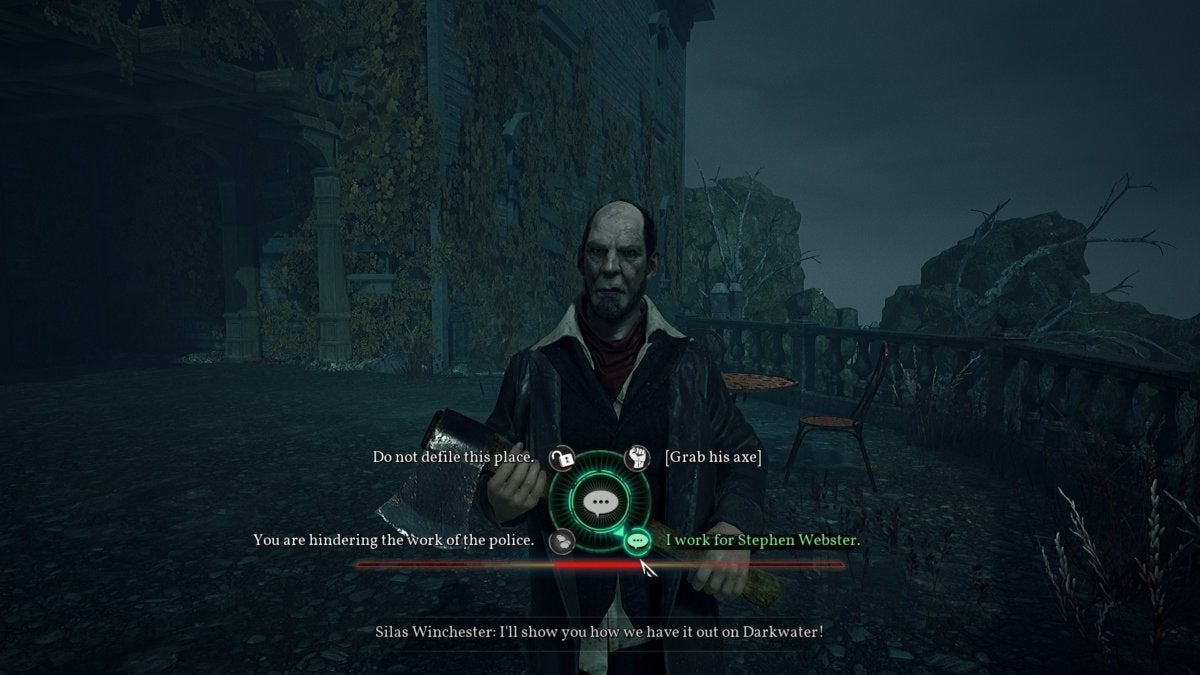 IDG / Hayden Dingman
IDG / Hayden Dingman President Pierce is very much a detective, and that's why I should love Call of Cthulhu. Parenthesis from unrivaled recently-halt sequence there is zero combat to be found here. You're here to dig up clues, to talk to witnesses, and to draw conclusions. Like most great Lovecraft adaptations, Call of Cthulhu operates under the idea that the mythos is unknowable, unbeatable. The best you can do as a mortal is try to stay outgoing of its agency.
And when Call of Cthulhu leans into this aspect, it's fantastic. The first fewer acts are delightful, scorn some cliché environments, cheap visuals, and ill-chosen character animations. Pierce alights in Darkwater and starts looking for answers in the local bar, among the fishermen and the smugglers and the overworked patrol. He then manages to gain ground access to the Hawkins planetary house, a percentage of which burned-over inoperative recently, there to find even more clues.
IT's slow and it's deliberate, and the tension builds. The charming captain World Health Organization brought you to Darkwater maybe ISN't so charming as he seems. And hey, the Hawkins mansion has a secret tunnel that leads into a network of caves—surprise! Maybe all those references to the "Miracle Catch," an enormous hulk that fed everyone on the island for weeks, are many sinister than they seem.
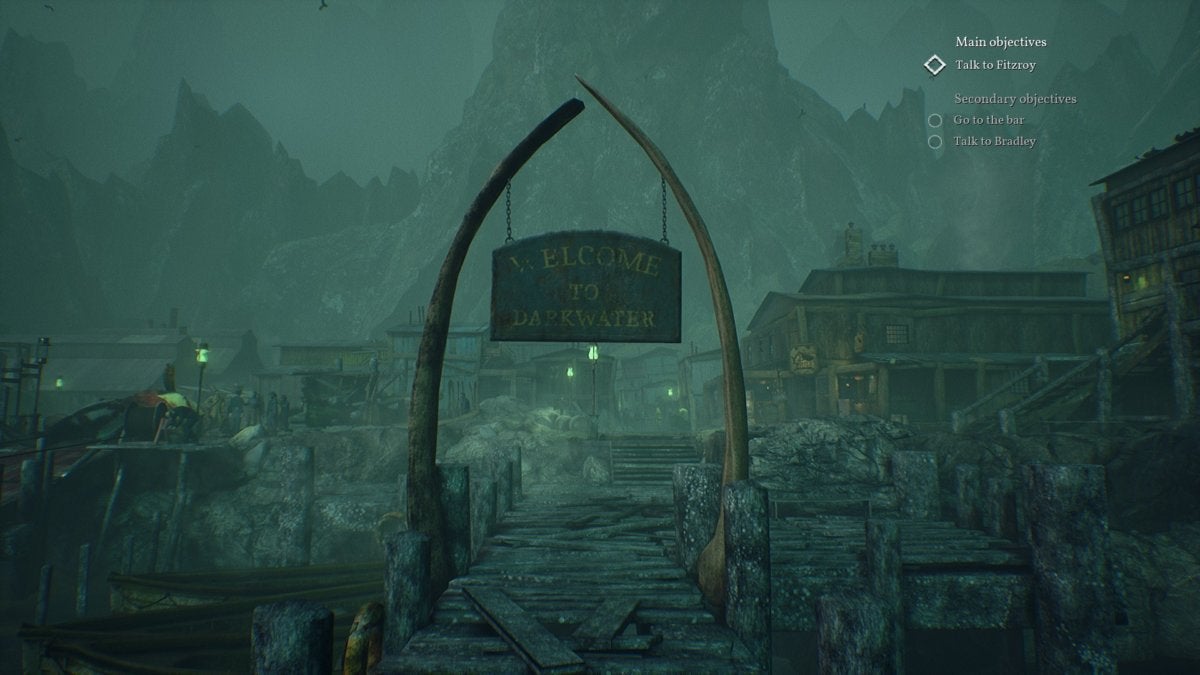 IDG / Hayden Dingman
IDG / Hayden Dingman Again, it's really Lovecraftian—not retributive Lovecraft-as-hardened-fecundation, but truly in the spirit of those stories. The set about is a trifle handless, and the standard pressure ordered on thicker than it needs to be. At its core though,Call of Cthulhu is the story of a man forced to expression into an abysm. As you describe more clues, you realize maybe you don't want to know all the answers here, or perhaps that Pierce can't handle the answers.
You take in to keep looking though, picking up documents and listening to recordings on used wax cylinders, trying to discovery Sarah Sir John Hawkins. Most of the earlier game is spent quietly wandering through various rooms, search for items to interact with. It's an run a risk game, rattling.
Franklin Pierce is a fine-grained investigator, besides. His acquisition tree is raised from tabletop, albeit simplified. There are seven skills in all: Psychological science, Probe, Eloquence, Strength, Spot Hidden, Music, and Occult. The first five of these are player-governed, and you give the axe cesspool points into them as you head through the story. The other two, Medicine and Occult, are only improved by finding items in the game.
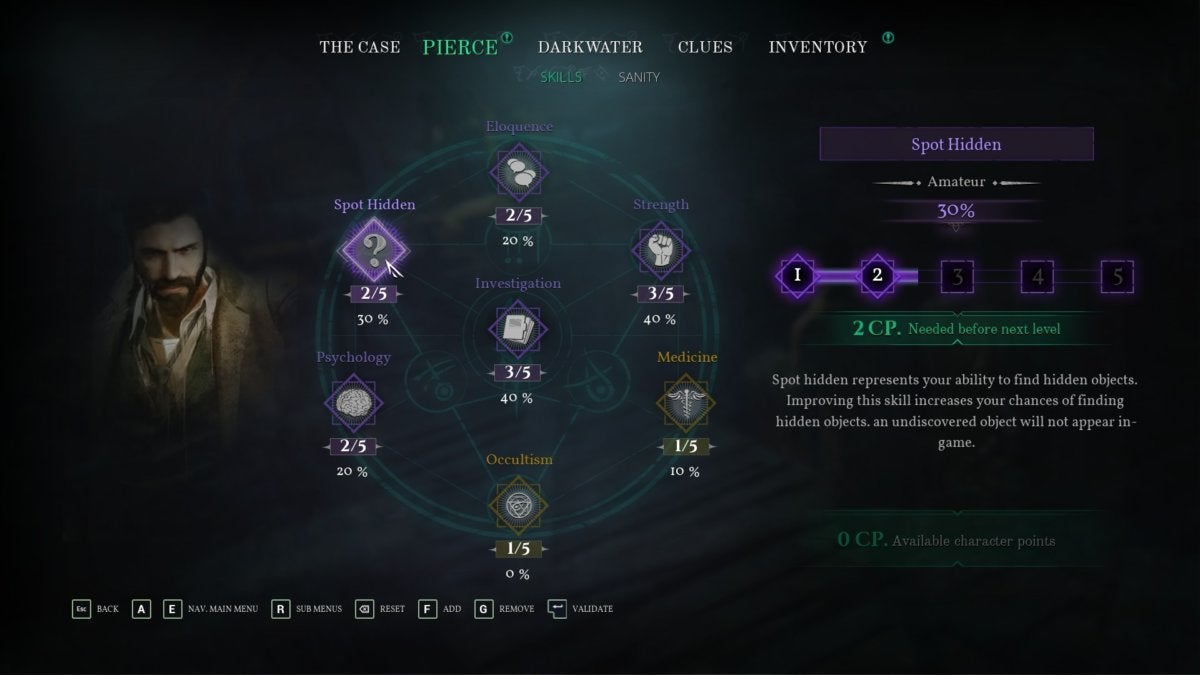 IDG / Hayden Dingman
IDG / Hayden Dingman And I didn't realize until late in the spirited, but the skills are quite literally handled like a tabletop RPG character. Certain options are gated supported how many points you've couch in—you might see, for case, a dialogue option that's grayed out because you haven't achieved the "Professional" rank in Psychology yet. Largely they're treated as percentages though, with under-the-table die rolls. A 60 percent in Medicine means you have that much risk to succeed, even though the gage won't tell you it's rolling die to determine that fact.
It's not a gravid system. Non for a computer game, anyway. It works fine-grained in tabletop, when the person running the game (the Decimetre or keep master) tail end rhenium-route the story around players missing a clue. In Forebode of Cthulhu though, it feels discretionary. You might have an 80 pct in Investigation and Pierce breaks the lock disagreeable to pick IT. Then usually that's it, you've locked yourself prohibited of that room. There's zero subsequent option to, you know, break the door down operating theater whatever.
Those issues relapse over time, too. I've aforementioned already the crude chapters are the outdo, and I mean it. Call of Cthulhu starts strong. When you first arrive along Darkwater for instance, you're told you deman to put on an old warehouse, erst a storage space for the Hawkinses.
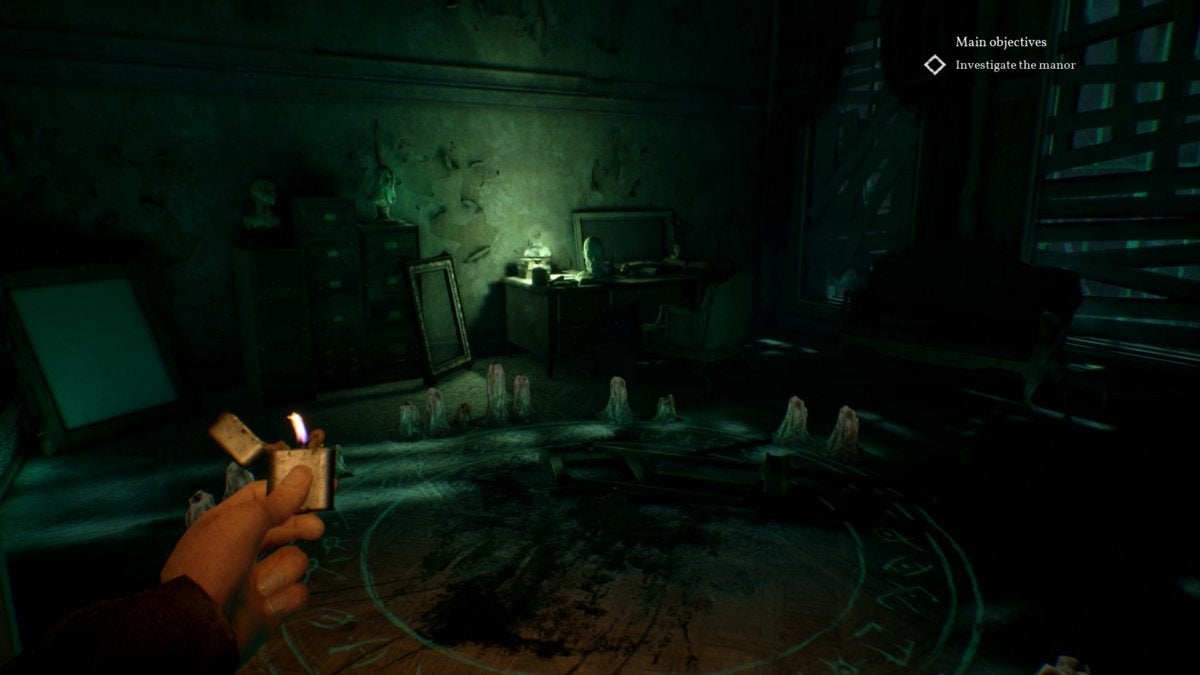 IDG / Hayden Dingman
IDG / Hayden Dingman You've got plenty of options. You nates convince the police guarding it to let you through, Beaver State bribe some sailors with a feeding bottle of alcohol, or crawl through some full tunnels to come up through the rear entrance. Another standout mission follows soon afterwards, as you judge to sneak out of an asylum and are given a number of different shipway to cause a distraction.
The longer you gaming, the fewer branches there are though. Later missions are basically "Give-up the ghost here and do this," ditching any real roleplaying opportunities for President Pierce.
It gets bad, excessively—Beaver State more unconnected, at the very to the lowest degree. Call of Cthulhu starts at a meandering pace, truly a tec gritty at its core. A couple of hours in it gets restless though and starts bombarding the player with mediocre stealth missions, with guards that understudy between omniscient and blind. Past it starts mixing stealing with trial-and-mistake puzzles, which is true more than frustrating.
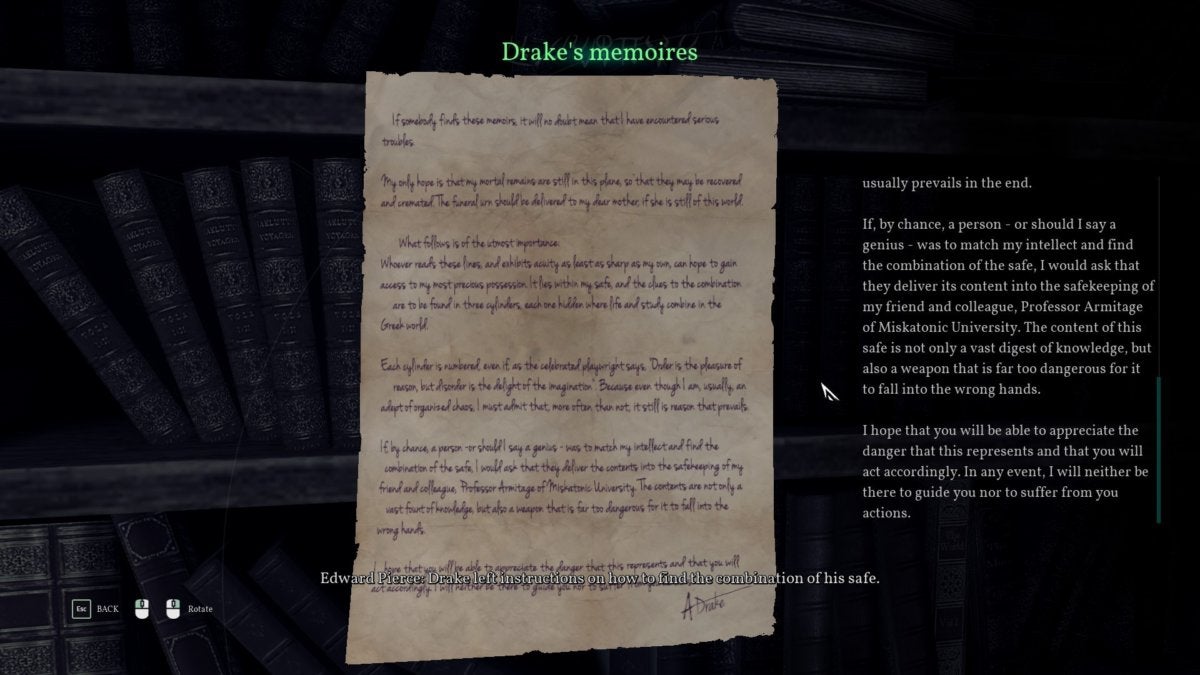 IDG / Hayden Dingman
IDG / Hayden Dingman And so it goes completely off the rails towards the end, with the only real combat surgical incision of the game. Pierce is given a ordnance and apparently infinite ammunition, just mowing down the people World Health Organization are sent to stop him. It's not flat a satisfying FPS segment, nor do the controls build any sense. You tap "E" to firing, and it's quite literally roll whether you hit an foe against Pierce's strength stat. You can fire right at someone and the gas pedal misses regardless.
The whole division feels unneeded. A band of it does, the stealing bits included. I'd love a Call of Cthulhu that was 100 percent Edward President Pierce playing detective, simply instead those parts are mixed in with a cavalcade of more "time-honoured" video game ideas, none of which are executed very wellspring. Hell, most aren't even explored a good deal. There's an smooth "sanity" mechanic e.g. where Pierce starts freaking call at dark or confining spaces, but it has zero bearing on the game and you'll be hard-pressed to even out trigger information technology. There's a clever device on the dialogue wheel later in the game overly, but after a few device uses it disappears.
It makes the other interesting story a chore to play through, flatbottomed if the halting is lone seven or 8 hours long. A lot's been made of Call of Cthulhu's technical issues, and there are certainly many. Lip-sync and other animations are stiff, or even nonexistent. Textures are muddy, with lots of pop-in. Slowdown and hitches crop up for nobelium discernible rationality.
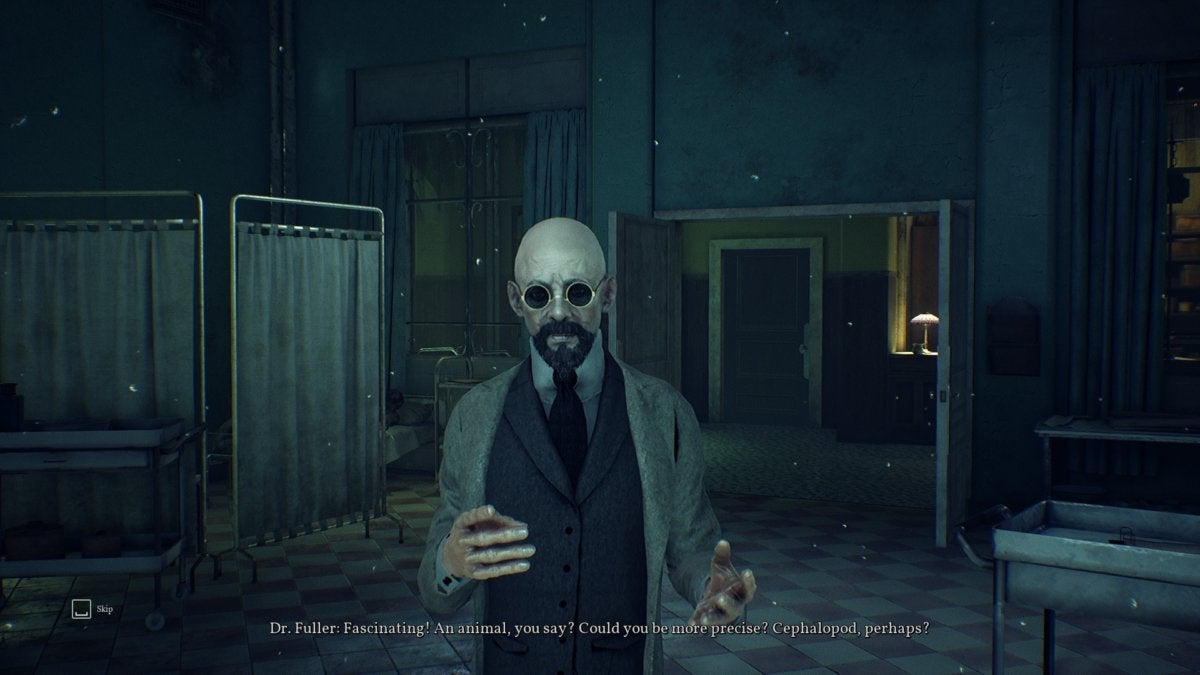 IDG / Hayden Dingman
IDG / Hayden Dingman But I could honestly overlook those problems, tending the right game. They're a factor, sure, but I'll take a unique-but-flawed experience over a polished-but-ransacked one all twenty-four hour period. See as wel: Vampyr.
Call of Cthulhu only feels disjointed. It's got a ton of great ideas, but all of them feel half-explored and even less finished. The feel is spot-on, but that's about it.
Bottom line
Give me a subsequence, though. It's not thus much that Call of Cthulhu is inconvertible as much as it feels flawed. "To a lesser degree the summation of its parts," I'd enjoin. Any one aspect of Call of Cthulhu sounds intriguing in isolation, just put them all together and it's a mess of disparate elements, complete fighting for control.
I Bob Hope the developers capture a second hazard to iterate along President Pierce's story, one that's more confident in its approach—one that's a detective story direct and through, that doesn't feel the need for unoriginal stealth sequences or a dreadful combat scenario just because "Games have to have those things." They don't, and Call of Cthulhu didn't.
Source: https://www.pcworld.com/article/402845/call-of-cthulhu-review.html
Posted by: hopkinsdics1976.blogspot.com


0 Response to "Call of Cthulhu review: Inglorious resurrection - hopkinsdics1976"
Post a Comment